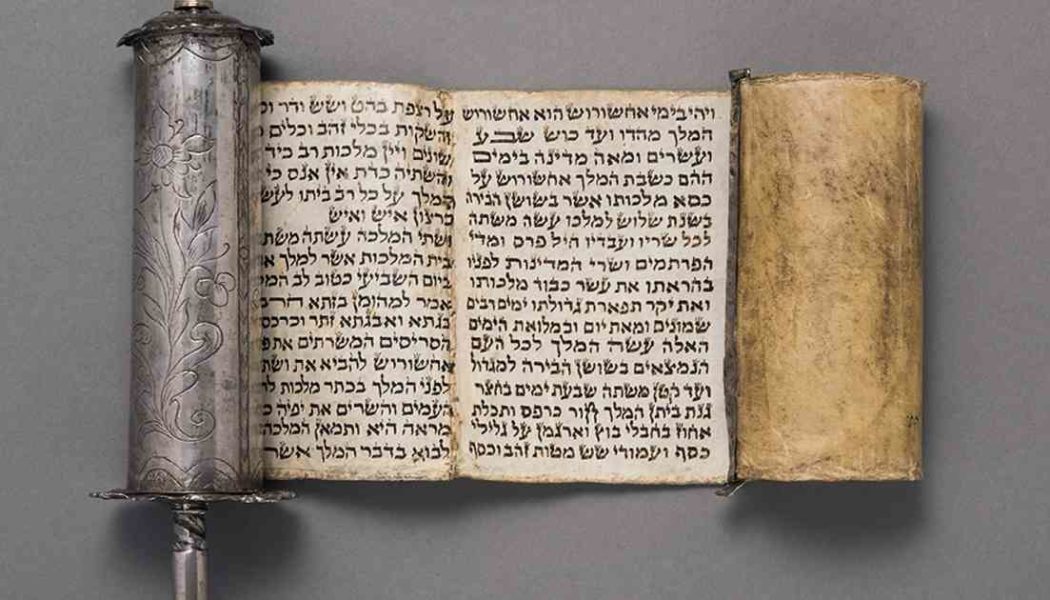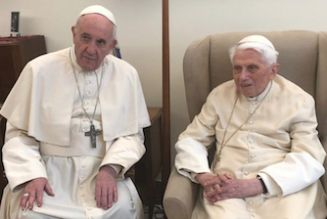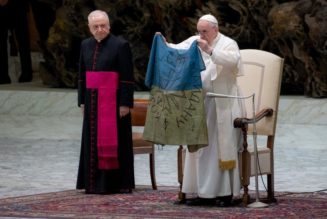
In the days before he died, Jesus wanted us to know we were invited to a big marriage feast in his honor, according to the readings for the 28th Sunday of Ordinary Time Year A.
For the last few weeks, and for the remainder of the liturgical year, the Church will present words spoken by Jesus after entering into Jerusalem, as he faced his imminent death. This gives them a high importance and a telling context.
The first person to apply any parable to is yourself.
The Wedding Banquet story this Sunday completes a picture we have seen in the Vineyard parables the last two weeks.
The vineyard parables can be summed up as: “Your life on earth is like a job working a vineyard.” They correct a number of misunderstandings: 1) We are the help, not the landlords on earth; 2) We owe God, not the other way around; and 3) Nonetheless, God wants us to be co-creators of what he is doing on earth.
The Wedding Banquet parable can be summed up as: “Heaven is like a Royal dinner party for homeless people.” It corrects misunderstandings of its own: 1) We don’t get into heaven by being in the right organizations. 2) We don’t get into heaven by passing some legalistic test, and 3.) People who refuse to change have no place in heaven.
The king summons the invited guests to the feast, but they say No. So he markets the dinner a little more, specifying the menu and increasing the urgency. Again people refuse. Why? One went to his farm to attend to his home life. Another went to attend to his workplace. Then, shockingly, “the rest laid hold of his servants, mistreated them, and killed them.”
The king’s reaction is also shocking: “The king was so enraged he sent his troops, destroyed those murderers and burned their city.”
That escalated quickly.
The key to remember is that this is a parable about heaven, and when someone comes to you to invite you and your friends to eternal bliss, killing them is a heinous reaction. But why does the king burn down their city? Again, because we’re talking about heaven here: We work on God’s vineyard, and he longs to have us join him. But we don’t have to choose him. And when we don’t … what’s the alternative?
Well, the alternative to working on the vineyard is simply taking what the vineyard has to offer, as if it were ours. But it isn’t ours. And the alternative to the Wedding Banquet is, well … standing outside with nothing to do.
But the parable is about God himself, and God is Being, Truth, and Love — and the alternative to God is therefore nonbeing, untruth and no-love. Once you realize that, it makes sense that the way to depict this in a parable is to imagine a king killing you and burning your city.
So, in the parable, the king goes to an impromptu new plan.
He says, “Go out, therefore, into the main roads and invite to the feast whomever you find.”
To the original Jewish audience, this meant that Jesus was moving on and would invite the Christians in their place. In our day there are many things it can mean: It could mean that the religious types who are too caught up in their own pride will miss out, while God will welcome those who are broken and trampled down by life to be too proud.
It could even mean that, if we refuse to choose God and his work, those of us who are affiliated with the Church Jesus Christ founded on Peter will watch their numbers drop while others who are not affiliated with the Church, but who are more willing to live a Christian life, will see their numbers rise.
But what we know it means is that Jesus wants us to pray, fast and serve. Those who find the time to do that are the ones who respond to the invitation and put on the full wedding garment that they need.
In the long version of the Gospel, Jesus tells the story about one of the impromptu guests who is not wearing the garment of prayer, fasting and service.
“When the king came in to meet the guests,” says Jesus, “he saw a man there not dressed in a wedding garment. The king said to him, ‘My friend, how is it that you came in here without a wedding garment?’ But he was reduced to silence. Then the king said to his attendants, ‘Bind his hands and feet, and cast him into the darkness outside.’”
If that sounds harsh, then we need to understand the nature of this event.
This totally undeserved wedding banquet is extravagant. This is the heavenly spread described in our first reading as “a feast of rich food and choice wines, juicy, rich food and pure, choice wines.” Don’t imagine a cafeteria line; imagine a White House state dinner.
The proper attitude toward such a feast is humble gratitude and a willingness to do whatever is appropriate to be in such a place.
Even Paul in today’s Second Reading points out that there is a certain behavior needed at a rich party: “I know indeed how to live in humble circumstances; I know also how to live with abundance. … I have learned the secret of being well fed and of going hungry.”
And please notice that the king gives the errant guest a chance.
The king asks him in a personable way, “My friend, how is it that you came in here without a wedding garment?” It seems like the man could have replied, “I am so sorry. I didn’t know. Let me fix it!”
But the man said nothing. At all. To the king. Did he turn a cold shoulder? Did he dismiss him with a wave of the hand? We don’t know. But the guest did get confused, it seems, about who was the King and who was the subject — which one was the master and which the servant.
If we have the same attitude toward Our Father who art in heaven that Belgium’s minister of high culture has toward the White House wait staff at a state dinner, we are doing God a great disservice.
The time and place to start having the right attitude isn’t later in heaven, but right here right now. And the attitude that we have toward God will be clear in the attitude we have toward our neighbor.
And the attitude we have toward God will also show up at the banquet we are already invited to.
The Eucharist is a rich and abundant feast. If you get an invitation, the proper response is “I am not worthy … but only say the word and my soul shall be healed,” and then to put on the new you, in Christ, when you attend. You do that by repentance and sacramental confession. If we expect to receive the Eucharist without having confessed our serious sins, the King will reject us as certainly as he rejected the guest with no wedding garment.
We need to learn to behave in the way appropriate to the king’s table. If not, we will begin by feeling out of place and soon end up by being out of there altogether.
Start this Sunday. Each Mass is a practice run for the eternal banquet to be held on the Holy Mountain “where the Lord will he Lord GOD will wipe away the tears from every face.”
Image: Magnes Collection of Jewish Art and Life, UC Berkeley.









